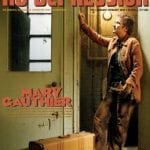Chatham County Line – Comin’ around to bluegrass
They have the instrumentation and sound of a bluegrass band. They definitely dress like one, and the four guys sure look comfortable gathered around that one microphone. But there’s an intangible at work, or maybe a specter — the ghost of rock past, an alt-country phantom sitting in as fifth member — that seems to make the music of Chatham County Line appeal to those who aren’t typically fans of bluegrass.
“It probably stems from the fact that we all come from kind of a rock ‘n’ roll school,” offers Dave Wilson, guitarist, lead vocalist and chief songwriter for Chatham County Line. “My first guitar was an electric guitar. I didn’t have an acoustic guitar until I had the electric for four or five years, and I grew up playing Hendrix tunes and ‘Magic Carpet Ride’ while learning the ropes.”
That plugged-in background is shared by the other three members of Chatham County Line: fiddler/mandolinist John Teer, banjo player Chandler Holt and standup bassist Greg Readling. (Readling and Wilson are former member of Tift Merritt’s band the Carbines; Teer previously was a cog in Thad Cockrell’s Starlite Country Band.)
“Nobody’s really a staunch, old-school bluegrasser, so we bring to this band and to our tunes kind of a different outlook,” Wilson continues. “We might be using the instrumentation of a traditional bluegrass band, but we’re not afraid to play rock songs, like Jayhawks tunes or Dylan tunes, stuff like that.” Indeed, the penultimate track of the band’s 2003 self-titled debut was a gutsy and heartfelt version of Dylan’s “I Shall Be Released”.
Discovering J.J. Cale and Leo Kottke opened up a world for Wilson that, while loosely connected, felt far beyond the southern rock that dominated the radio in Charlotte, North Carolina, when he was growing up. That exposure served as a bridge to bluegrass and other forms of traditional music, and Wilson was hooked when it became clear to him that his songs sounded better with acoustic guitar.
“We definitely all came to it later,” says Wilson of the band’s relationship to bluegrass and acoustic music, “but it was for a love of that style of music, and for a love of the formality of it. We love to wear the suits…we love the choreography and the show of it.”
Chatham County Line has become devoted to the traditional one-mike method, for better or worse. “If you’re in a noisy, smoky bar where people are talking, which is 85 percent of the shows we play,” Wilson shares with a laugh, “it is a huge challenge just to be heard and actually hear yourself.”
But Wilson believes the benefits balance out the hardships. “We like it because we can mix ourselves onstage. The way we play and the instrumentation, the closer we are together, the more we can hear each other. It kind of sweetens it when it all comes together. I don’t know how to describe it, but right before it enters the microphone, it is everything in its entirety.”
Perhaps the most striking part of that whole is the band’s harmony singing, led by Teer. “John is really an intuitive harmony singer that just kind of finds the right note,” Wilson says. “When I have a new tune, we’ll play it and practice it a few times, and he’ll feel out the right lines. That’s really how we build our harmonies.”
When the harmonies expand, Readling enters the picture. “If Greg hears a third part, he comes in,” Wilson says. “We feel really bad keeping him as a bass player. He’s the Garth Hudson of the group, the most musical. He can play anything, and play it well.”
In fact, all four guys are fine players, and Wilson’s strong songwriting makes Chatham County Line a true triple-threat outfit. His stories seem rooted a generation or two in the past; among the highlights of the band’s debut were “WSM (650)”, about a family that trades its radio for a bin of coal, and the jaunty history lesson “Tennessee Valley Authority”.
The follow-up, a Chris Stamey-produced effort due in February on Yep Roc tentatively titled Dark Clouds, carries the torch thanks to such songs as “Route 23” and “Engine #709”. The former tells the tale of a family-run service station that goes out of business when a new highway is built; granted, the events depicted could have taken place three years or three decades ago, but the use of the semi-antiquated term “service station” seems to set the song in another time. The latter is a banjo-and-fiddle-fueled locomotive that feels like it’s been a festival staple for 50 years.
The new tunes were duly road-tested on a month-long tour last summer in Colorado. That trip culminated with an appearance at the Rockygrass Festival in Lyons, Colorado, and somewhat to the band’s surprise, they walked off with top honors in the festival’s band competition.
“It was a muddy, nasty day,” Wilson recalls. “It had rained a gully-washer the night before. There we are in our suits, ruining our boots.” Those harmonies, however, remained crystal clear.




